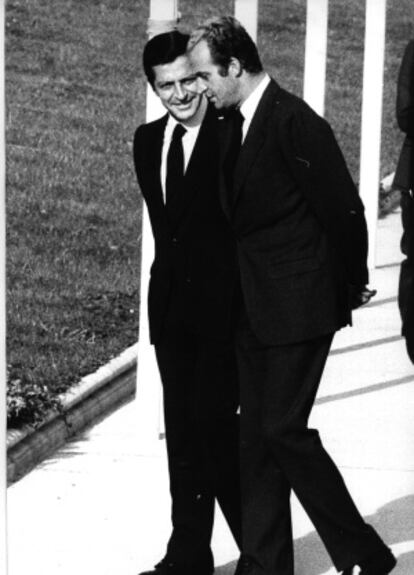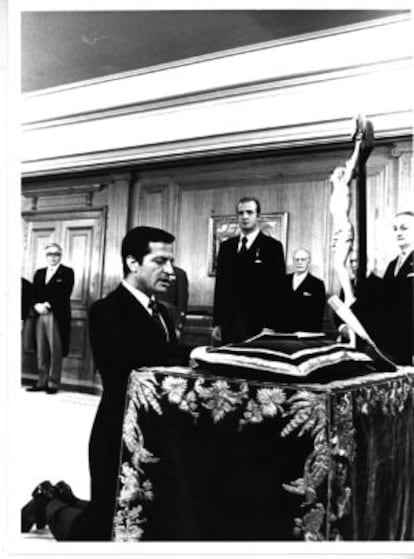Adolfo Suárez, father of Spanish democracy, dies at age 81
The first prime minister of the democratic era, the man who guided the transformation of Spain after the Franco dictatorship, passed away in Madrid on Sunday

Adolfo Suárez, Spain’s first prime minister following the Franco dictatorship, the man who spearheaded a rocky but successful transition to democracy by legalizing the outlawed Socialist and Communist parties and the labor unions, died on Sunday after a long battle with Alzheimer’s. He was 81.
The former prime minister had been suffering from the disease for the past decade and had not appeared in public since 2003, when he attended a political rally for his son, Adolfo Suárez Illana.
On Friday, a tearful Suárez Illana announced at a news conference at the Cemtro de Madrid clinic that physicians had given his father no more than 48 hours to live. "The disease has progressed a lot and everything indicates that the end is imminent," he said.
The elder Suárez had been taken to the clinic on Monday suffering from a respiratory infection.
History will remember Suárez for his bravery in standing up to a gang of Civil Guard officers who tried to take over the young Spanish government in an attempted coup on February 23, 1981. Led by Civil Guard Lieutenant Colonel Antonio Tejero, the armed men stormed into Congress the day lawmakers were voting on the prime minister’s successor, Leopoldo Calvo Sotelo.
As deputies ducked for cover when Tejero and his men began firing their weapons, a stoic Suárez remained calmly seated without even flinching. The entire event was captured by television news cameras.

Born in Cebreros, Ávila province, Suárez studied law at the University of Salamanca. He held several top government posts during Francisco Franco’s regime.
In 1976, months following the death of Francisco Franco, King Juan Carlos had asked Suárez to take over as prime minister from Carlos Arías Navarro – the dictator’s last prime minister – and organize free elections. The monarch’s choice didn’t sit well with many leftists because Suárez had held various Cabinet posts under Franco, including minister of the National Movement – the only legal political organization during the dictatorship.
A mastered negotiator, Suárez ruffled feathers in the military and among the far-right after he invited Socialist leader Felipe González, who had been living in Paris, and Santiago Carrillo, the Spanish Communist Party (PCE) chief who was in Moscow, also in exile, to join the democratic process.
“We had some very difficult challenges during the Transition not only with the military but with the Catholic Church and labor unions as well. And since then they have all recognized their duties,” said Santiago González who served as his press aide from 1976 to 1982.
Through the Political Reform Law of 1976, Suárez was able to steer Spain to hold its first free elections in four decades and legalize the unions. He organized his own coalition, Democratic Center Union (UCD), and in 1977 became the first democratically elected prime minister following the Franco dictatorship, capturing more than 34 percent of the vote.
González and his Socialists came in second with 29 percent support.
The following year, Spaniards voted on a new Constitution in a referendum.
Despite the large support for his democratic reforms, Suárez’s government was plagued by the growing restlessness of pro-separatist regional factions in the Basque Country, Galicia and Catalonia which openly began discussing their drives for independence – issues that were taboo under Franco.
At the same time, Suárez also had to deal with the soaring number of murders and violence committed by the Basque terrorist group ETA, which became bolder in its plots now that Franco was gone. The period during Suárez’s government marked ETA’s most active years; the terrorist organization committed more than 240 murders between 1978 and 1980.
While under pressure from different parties, unions and other groups, Suárez, according to some historians, became fed up with factionalism inside his own UCD. Although a conservative coalition, the organization he had founded included members from a broad range of ideologies.
Suárez was also beset by the constant uneasiness inside the military, which was still fuming over the prime minister’s decision to legalize the PCE – a move seen as a slap in the face by many senior officers who fought a bloody Civil War (1936 to 1939) to rid the country of Marxists and radicals.
Rumors that a coup was imminent had plagued Suárez throughout his term. In 1978, the government put down one attempted military putsch known as Operation Galaxia and one of its leaders, Antonio Tejero, was given a seven-month sentence.
In January 1981, Suárez stunned the nation when he announced that he was stepping down as prime minister. Congress met on February 23 to ratify Leopoldo Calvo-Sotelo as his successor but the vote was interrupted when Tejero and his men broke into the chamber and held the deputies hostage throughout the night.
The coup petered out when King Juan Carlos took to the airwaves demanding that the armed forces respect the democratic institutions, prompting millions of Spaniards to march out on the streets in support of democracy. Tejero was given a 30-year sentence while other coup participants served various jail terms.
After he stepped down as prime minister and left the UCD, Suárez organized a new party, Democratic and Social Center (CDS) and announced his candidacy for the 1982 elections. The CDS obtained poor results, while González and his Socialists were swept into office.
Suárez toyed with politics for years afterwards but was never able to gain the same momentum or raise similar excitement as he had in 1976.
He made frequent appearances at political rallies and official state ceremonies, and preserved his long lasting friendship with King Juan Carlos, who bestowed upon him the title Duke of Suárez.
Personal tragedy struck the former prime minister at the beginning of the last decade when his wife, María del Amparo Illana Elórtegui, died from cancer in 2001. Three years later, the disease took the life of his eldest daughter María del Amparo ("Marian") Suárez Illana.
Suárez’s last public appearance took place in 2003 during a rally to support his son, Suárez Illana, who unsuccessfully ran for regional premier of Castilla-La Mancha on the Popular Party ticket. He lost to Socialist José Bono.
After much press speculation about his health, in May 2005 Suárez Illana announced on Spanish television that his father was suffering from Alzheimer’s.
One of the last photographs of Suárez released to the press was taken by his son in July 2008. The touching photo shows the king walking with his arm around the former prime minister at Suárez’s home where the monarch had gone to visit him.
“The king's relationship with my father has always been exceptional," the son said last week. “Thanks to the king, he was head of government. Thanks to the king, he was able to do what he liked at a unique moment in the history of Spain. Together, they changed the course of history."
Tu suscripción se está usando en otro dispositivo
¿Quieres añadir otro usuario a tu suscripción?
Si continúas leyendo en este dispositivo, no se podrá leer en el otro.
FlechaTu suscripción se está usando en otro dispositivo y solo puedes acceder a EL PAÍS desde un dispositivo a la vez.
Si quieres compartir tu cuenta, cambia tu suscripción a la modalidad Premium, así podrás añadir otro usuario. Cada uno accederá con su propia cuenta de email, lo que os permitirá personalizar vuestra experiencia en EL PAÍS.
¿Tienes una suscripción de empresa? Accede aquí para contratar más cuentas.
En el caso de no saber quién está usando tu cuenta, te recomendamos cambiar tu contraseña aquí.
Si decides continuar compartiendo tu cuenta, este mensaje se mostrará en tu dispositivo y en el de la otra persona que está usando tu cuenta de forma indefinida, afectando a tu experiencia de lectura. Puedes consultar aquí los términos y condiciones de la suscripción digital.








































